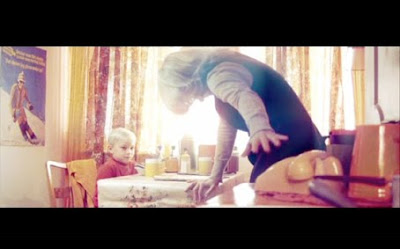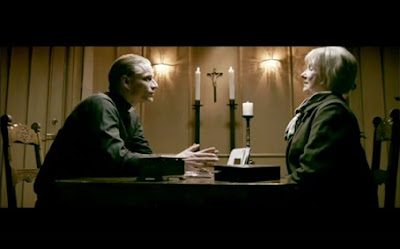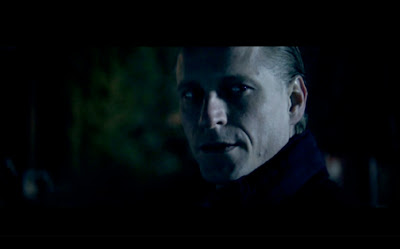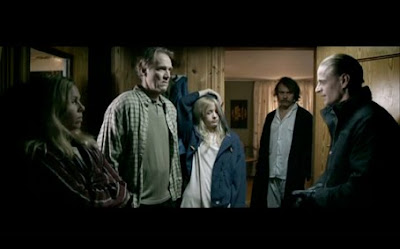

THE MONDO CANE COLLECTION
Directed by: (Paolo Cavara), Gialtiero Jacopetti, Franco Prosperi
Italy, 1962, 1963, 1969
Mondo, 108min, 95min, 128min
Distributed by: Trinity Films

















THE MONDO CANE COLLECTION
Directed by: (Paolo Cavara), Gialtiero Jacopetti, Franco Prosperi
Italy, 1962, 1963, 1969
Mondo, 108min, 95min, 128min
Distributed by: Trinity Films
















Orgasmo
Directed by: Umberto Lenzi
Italy/France, 1969
Mystery/Thriller, 91min
Umberto baby – what a trip! As customary I’ll start by saying it again, stick Make them Die Slowly back in it’s case, and seek out the older Umberto Lenzi Gialli and thrillers, because they are some really excellent movies back there that give a better insight into the arts and crafts of that fantastic director.


Following his directorial debut with a pompous period piece – pompous in a good way that is – Le avventure di Mary Read (Queen of the Seas) 1961. From there on he busted onto the scene with a string of Spaghetti Westerns, period pieces, action thrillers, sword and sandal adventures before he rekindled with that genre he’d been so fond of previously – the mystery genre. He did this with a loose trilogy all based on the themes of deception, double-crossing and death. Orgasmo (Paranoia) 1969, Così dolce… così perversa (So Sweet… So Perverse) 1969 and Paranoia (A Quiet Place to Kill) 1970. See some knob somewhere decided that Orgasmo should be called Paranoia which screws things up for that later movie doesn't it, and don't be misled by the title, Orgasmo isn't a screw movie, it's a genuine mystery thriller.

Orgasmo starts off the trilogy of mystery, and also sees the first of four collaborations between Lenzi and actress Carroll Baker. She would go on to star in the following two and the later early Giallo Il coltello di ghiaccio (The Knife of Ice) 1972. Lenzi show’s that he completely understands that there’s no need to waste valuable time on exposition and starts off with Kathryn West returning to Rome after her husband has suddenly died in a freak car accident – there’s no pointless funeral and wishy washy going on, but instead he cuts right to the chase and starts it all off. Some time is spent on establishing Kathryn and her world, her close friend Brion Sanders [Tino Carraro] who deals with all the paperwork following husband Robert’s death and Teresa [Lilla Brigone] who runs the mansion. A soon as we know the setting, Peter Donovan [Lou Castel] makes his entrance. Honking his horn and shouting aloud it’s a fair bet that he’s the antithesis of all Robert once was and it’s no wonder that Kathryn is drawn in by his rough charm and arrogant frankness.


From here on the movie takes a plunge into subtle and lusty exploration, there’s a delicate, provocative and suggestive eroticism between the three characters which slowly shifts into a sadistic deconstruction of Kathryn’s mental state.

In the last act, Kathryn uses all her strength to break free from the now abusive couple and certainly put’s up a great fight, but weakened both mentally and physically from long sessions of drink and drugs this is one battle she appears to be loosing. Never the less, Lenzi and co-writers Ugo Moretti and Marie Claire Solleville have a series of surprising twists and shocks up their sleeves before the movie finally comes to it’s crashing climax.

The editing style of Enzo Alabiso (wonder if he's related to Eugenio Alabiso?) is evident and a vital component of the movie. It moves rapidly and forcefully without taking unnecessary breathers that would have slowed down the pacing of the piece. Lenzi would use the talents of Albiso on several movies to follow. So keep your eyes on the screen because Orgasmo moves fast. Adding to the determined forward movement of the piece is cinematographer Guglielmo Mancori’s effective bag of tricks. Orgasmo is riddled with delicate dolly moves, fast swoosh pans and crash zooms to corner in the vital moments – most often focusing on Carroll Baker’s various facial expressions. Mancori and Lenzi would work together on at least seven more movies and Macori would go on to shoot some great genre pieces before calling it a day at the end of the eighties.

There’s the score. A vibrating and quirky score by the majestic Piero Umiliani who you know from such great pieces as Luigi Scattini’s Svezia, inferno e paradiso (Sweden Heaven and Hell) 1968, Mario Bava’s 5 bambole per la luna d’agosto (Five Dolls for an August Moon) 1970 and Corrado Farina’s Baba Yaga 1973 – which also starred Baker in a leading part. The score starts of very suave and quirky, but develops alongside the tone of the movie, the darker the movie gets and the deeper Kathryn falls into her mental decent.

The vocal piece of the movie Fate had Planned it so sung by Lidia MacDonald (the Scottish born singer who also sings on the Sweden, Heaven and Hell album - a must if you don't already have it) is used rather sparsely and holds a wonderful cynical mood that fits the movie, the more rockier track Just Tell Me performed by Weiss and the Airdales is the one that sticks out, but with reason, as it’s used several times to mark a rift between the very young Paul and Eve and the middle aged Kathryn.

An interesting final note on Orgasmo can be found in the fact that the Italian version differs from the American version. The ending of the American version brings a satisfying justice to all ending, but leaves certain valuable information out of the conclusion. Where as the original Italian ending stays closer to that cynicism that we all love about Italian genre cinema and ties in with the references to Robert’s sudden death in that car accident which is mentioned on several occasions. Without the conclusion to this important arc, the referents seem odd and out of place, and rather posing the question what happened to Robert? Well the answer, as told in the Italian version, is that Kathryn isn’t quite the hapless victim that she seems, but rather the initiator of an previous scheme outside the main narrative to claim the entire will and estates of Robert for herself. His death makes her a terribly wealthy widow! I can’t tell you why the decision to change Kathryn's character was made, but perhaps it was in a move to make her a more empathetic victim rather than a cold hearted and complex villain. Lack of dimension and polarisation has always been a favoured trait in American cinema so I’d guess that’s why. Also the Italian version is a preferred piece as it also has a lot more of the sensuality and nudity that comes with the blooming relationship between Paul and Kathryn and later Eve, which the American version exorcises on at least three occasions. We can’t have our empathetic victim being a sexual predator, enjoying both straight and lesbian sex can we, because we all know that bad girls go to hell and we have to keep it easy to follow…

Orgasmo is a riveting movie, which definitely demands that someone salvage it from poor quality copies and re-releases it in a pristine version because it’s a true gem that most certainly will find a new audience. It’s high on entertainment value, effective and still has a decent surprise ending even though there’s an endless amount of movies been made in the same niche both before and after this one. But if you are looking to explore early Umberto Lenzi, the mystery trilogy is an excellent place to start before following the path of evolution towards the splendid Gialli to follow. Just make sure to enjoy the Italian version not the American one will you.



This is something quite unique – a good scary movie with some heavy atmosphere that stems from Sweden! If I was asked which Swedish horror flicks are good I would blurt out two or three and then have to search my mind, because there are not too many of them.

The obvious one is Thomas Alfredsson’s smash hit Låt Den Rätte Komma In (Let the Right One In) 2008, and then it gets tricky. Mikael Håfström’s Strandvaskaren (The Drowning Ghost) 2004, Anders Banke's Frostbiten 2006 and Martin Munthe's Camp Slaughter 2004 all fall deep into a pit of ridicule and predictable genre conventions. But at least Camp Slaughter has Fred Andersson giving the performance of a lifetime to make up for it. Someone needs to give Andersson a real acting gig because with each performance I see him in the more he shows his wide repertoire.

But even though there may not be a lot of Swedish horror, I’d definitely point you towards some earlier stuff that I find interesting. 1988 Jack Ersgård directed a kind of schlocky flick called Besökarna (The Visitors) that, in a nutshell, is a haunted house movie with a slow build, a monster hidden in the shadows and pretty all right movie when it all comes around. When I first saw it in the eighties I hated it, and someone wrote that the most scary thing that happens in the movie is that the wallpaper falls off the walls in the children’s nursery. Partially true, but when I revisited it a year or two ago, I was surprised at how well made it actually was. The slow build really established the characters well as they take a plunge down mentally, and then the constant reluctance to show the ghost. Well back in the day this was what I felt wrecked the movie, but in hindsight it’s actually what makes it still stand the test of time. It actually works and becomes a decent little moody piece, which relies on me as an audience to fill in the blanks, and the entity that I imagine is by far more shocking than the one actually revealed in the end. Then I’d definitely point you to sexploitation director Torgny Wickman’s Skräcken har 1000 Ögon (Fear has 1000 Eyes) 1970 even Gunnar Höglund’s Kungsleden (Obsession) 1964. Kungsleden is a sombre headfuck that manages to engage and challenge its audience. That’s two more movies that you should look into if you want to see some interesting stuff.


Ingmar Bergman. Even though I constantly moan about the other directors that unfortunately disappeared in the shadow of the great Ingmar Bergman, even he couldn't keep his grubby little fingers away from the horror genre. Amongst his canon there are two that stick out as horror flicks – he even referred to them as his horror flicks – even though he made some really scary stuff where he explored the human psyche too. But never the less Vargtimen (Hour of the Wolf) 1968 and Jungfukällan (The Virgin Spring) 1960 are pretty grim stuff. Vargtimmen tells the tale of a man who sees demons and drags his wife in there with him, and Jungfrukällan is very much indeed one of the first rape revenge movies posing the question when is it right to take another persons life. It also supplied Wes Craven with a story to base his Last House on the Left 1972 with. By the way, both movies star Max Von Sydow and Liv Ullman and are required viewing if you want to talk about horror and Sweden from now on.



Quck fix for you before we get into the heavy stuff. A Young priest, Henrik Hornéus, [Jonas Malmsjö] is a beloved priest who holds sermons on the love and happiness that heaven will bring. Yes people, there is no hell in his religious view as the Swedish Church abolished Hell during the late eighties (true it did happen). His world is at its best when he is in his throne in the Church as his cold relationship to his son he has with his ex-wife. This is shown as he clumsily tries to talk to his son a few moments before his ex comes to pick the young lad up. It’s also here the movies weakest moment is found as the relationship between Henrik and his new biddy Karolina [Julia Duvfenius] coldly passes by. The phone rings and Karolina tells Henrik that his father has drowned.

The moment that Henrik leaves the sanctuary of his safe Stockholm parish, odd things start to take place. On his nocturnal drive to his fathers last resting place he encounters his first “ghost” and also whips out his cell phone to check for coverage – why oh god why do we need to show that characters have cell phones but they can’t use them… wouldn’t you be better off not showing them at all? Anyways he walks to a farmhouse near by and after seeing a child demon he get’s some assistance from the damned odd family living there. They are obviously concealing some serious stuff from Henrik. Later that night he has a second cryptic encounter with the child demon – which will fall into place if you think about it after the movie – and Olle [Björn Bengtsson] starts to insinuate that Henrik’s Father Gabriel didn’t die accidentally but was actually murdered! This sets up the movie, establishes Henrik’s ordinary world and slowly introduces a perhaps not to original protagonist, but its done in a really good way. And it goes to places I never thought it would go from there.

Psalm 21 is a pretty decent piece of cinema within the context of Swedish genre movies. It surprised me because I wasn’t expecting a movie of this complexity, not to mention the scares, surreal dream imagery and excellent special effects – even if they are CGI and made by the same people who did the Harry Potter movies FX. Sure it has a few flaws but actually does deliver some scares and has a rather interesting line of question. It relies heavily on religious themes – Faith being the obvious one. Now I’ve been living here since the seventies, and never actually understood that the Swedish church abolished Hell. Not that I’m much of a religion guy anyways, man is a conscious being, we chose to do wrong or right without any pending threat of going anywhere after life. It’s a heck of a lot more complex than doing right to go to heaven… But Psalm 21 uses this abolishment of Hell and uses it effectively in its narrative. At first I thought the movie ended with Henrik loosing his faith – which would have been cool as the mother of all Religion themed movies, The Exorcist sees father Karras' regains his faith – but it’s more of him questioning the set of rules his religious ground is based on. He still keeps his faith, but he can’t go on under the premise that there is no Hell. Instead he has to face the facts that people actually do bad things just for the sheer pleasure of if. There is a hell and that shakes his perception of the world under God completely out of whack.

Guilt is used pretty much and primarily as a force of antagonism. It’s explored though Henrik’s back-story, and also motivates Henrik to widen his views at the climax of the movie. His mother [Lena B. Eriksson] dies in the opening sequence – through a really good looking flashback he keeps returning to that day, and then his mother starts to turn up in his hallucinations. One of them is a pretty shocking twist to an erotic encounter with Nora [Josephine Ljungman] that would have Oedipus jumping with joy. But that parental death never really left Henrik and it’s a pretty strong motivator to his nightmares and self-image. Yes, he thinks of himself as a demon, which is probably why he’s preaching the love of God and heaven so intensely. Sure his father is a Priest too, but I guarantee you that the guilt of his mother’s death is what made him chose the profession.

The usual good versus evil symbolism is pretty sparse, instead it’s represented through a pretty darned clever use of various interpretations of psalm 21 which has different reasoning in the various sources that it can be found in, older editions vs. newer editions of the bible, psalms and Psalteries.


But my hat is off to Björn Bengtsson who does a marvellous job as Olle. Olle has some very concrete thoughts of what has happened to Gabriel and as he too is an aspiring priest it causes some serious contradictions for him. And being in the position he is he can’t quite deal with them, or react to them, by his own hand alone. It’s a great supporting character.


Fredrik Hiller has made a really interesting and good movie here, and I think it’s fair to say that this also proves the power of independence. For many years Hiller has been a background actor and voiceover artist featured on cartoons. Following a break in Hollywood where he starred in Robert Zemeckis' Beowulf against Ray Winstone and Angelina Jolie, he buggered right back to Sweden and spent his earnings on the project he’d been yearning to do for almost two decades, direct his own horror movie. The result, Psalm 21, is a good honest old school shock fest with some great use of themes and questions that you really want to check out when it comes around. Because this is one of the best Swedish Horror flicks right now.

Here’s a first… a Star Wars post here. So, really should be doing something much more important, but whist watching my daily dose of t...
